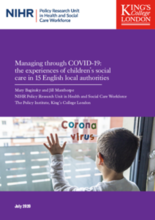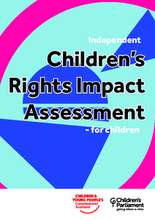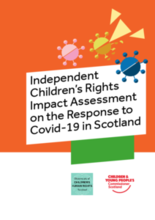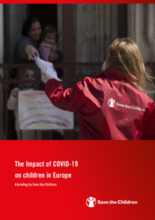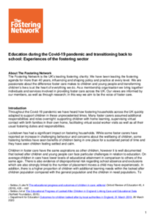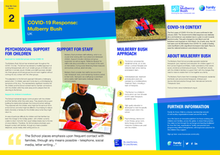

Displaying 481 - 490 of 1646
This research set out to capture the ways in which adaptations were made by UK local authorities in light of the COVID-19 pandemic. This report is based on the experiences of 15 local authority children’s social care (CSC) departments that volunteered to participate in the research and whose views were captured between late May and early June 2020.
In this opinion piece for the Scotsman, Lorraine Moore, Manager of the Edinburgh-based HUB for SUCCESS, expressed concern over the implications of COVID-19 on children in care and care-experienced young people and proposes a model for addressing the poor educational outcomes for care-experienced people
The briefing begins by providing a brief overview of the current situation for care experienced young people in Scotland, highlighting significant recent developments which provide a context for discussions about the impact of lockdown on care leavers.
This child-friendly Independent Children’s Rights Impact Assessment (CRIA) shows what the Scottish Government still needs to do to protect children’s rights during the coronavirus pandemic.
This Independent Children’s Rights Impact Assessment identifies significant concerns around decision making and scrutiny and highlights the impact on children and young people of the responses to COVID-19 in Scotland.
This article argues that "we can't afford child protection" - there is a need for a fundamental shift, particularly in light of the COVID-19 pandemic, from focusing on risk and blame to supporting families and children - and discusses a framework for a new approach and strategies for change.
This paper is divided into two parts: The first details the evidence from the ground, painting the picture of life for children during the pandemic in different European countries with statistics and examples, and giving a set of recommendations on measures that national governments across Europe can take to help protect children from the worst impacts of the crisis relating to the economic impacts on families, loss of services, access to education and targeted measures for children in migration. The second part focuses on recommendations to the EU institutions on how EU policy and funding can support and complement these national-level actions in these challenging times.
This report from the Fostering Network presents findings from a rapid response survey for foster carers and fostering services across the UK that sought to understand fostered children’s experiences of education during the pandemic.
Family for Every Child, as part of its How We Care initiative, has developed a series on Psychosocial support for children and families during COVID-19, which highlights different approaches taken by three of its member organizations to providing essential psychosocial support to vulnerable children and families within the context of the pandemic.
This How We Care series explores how Family for Every Child's Members are providing essential psychosocial support to vulnerable children and families within the context of the pandemic.

